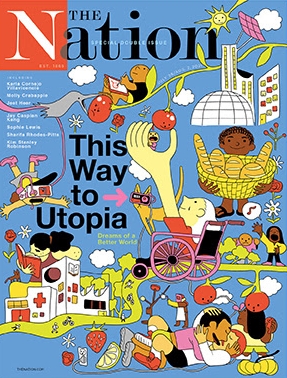The Nation magazine has just run an issue devoted to utopia:

Here’s from one piece:
The genre of utopian fiction, born of frustration during periods of thwarted promise, is a uniquely sensitive barometer of historical change. People start writing utopias when they feel discontented with the existing order…
Utopia and Dystopia Are Twins—Both Are Born Out of Criticism
And here’s from another piece:
Utopia… is famously “no place,” an idealized society sometimes described right down to its sewage system. In utopia, everything works well—maybe even perfectly, but for sure better than things work now. So utopias are like blueprints, while novels are like soap operas. Crossing these two genres gets you the hybrid called the utopian novel: soap operas put in a blender with architectural blueprints. It doesn’t sound all that promising.
Then came Ursula K. Le Guin’s The Dispossessed. Published in 1975, this was the first great utopian novel, and it demonstrated just how good the poor, misbegotten hybrid can be. Of course, there’d been earlier utopian novels, like William Morris’s News From Nowhere, or H.G. Wells’s A Modern Utopia, or Charlotte Perkins Gilman’s Herland, or Aldous Huxley’s Island. These were all interesting efforts. But Le Guin’s book was a triumph. What she showed is that by describing a utopian society in a moment of historic danger, you create for it all kinds of problems that its characters must solve. It will get attacked from the outside, corrupted from the inside; things will go wrong, and so you have your plot. Le Guin combined an intriguing utopia with a compelling novel, and the result was superb.
